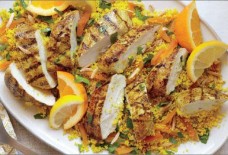‘Arab Women’ Speak to the World
SOURCE: THE DAILY STAR
BY: VICTORIA YAN
BEIRUT: Two contributors and two editors of the anthology, “Arab Women Voice New Realities” assembled for a roundtable discussion of the book this Saturday evening past at Aaliya’s Books, on Gouraud St. One of several talking points was the multiplicity of identities embraced by Arab women. “There is a sense of responsibility in a book like this, that the stories need to document life in the Middle East,” contributor Zeina Abi Assy told the largely female audience, “but it doesn’t. It documents 27 experiences, ” she added.
Launched in November by Turning Point Books, the anthology is comprised of short stories – fiction and non-fiction – written by 27 women from across the Arab world. While all stories are published in English, six were translated from Arabic.
The diverse backgrounds of the authors and their stories – some being professional writers, others writing in their spare time – reflect the array of experiences among women living in the region.
The collection is co-edited by Roseanne Saad Khalaf, an author and associate professor at the American University of Beirut, and Dima Nasser, a former editor at Turning Point, now a PhD candidate in Comparative Literature at Brown University.
The editors sought to amplify the voices of their contributors, celebrating their differences and commonalities, a point Nasser highlighted while discussing the process of assembling the anthology.
“When we were soliciting stories, we were hoping to look for women in diaspora and [capture] what their understanding of identity is. Although we weren’t able to get them – since our call for stories was open for such a short amount of time – we surely did put our feelers out there to hear more about the diaspora.”
Abi Assy and Raya Hajj, the two writers on hand for the roundtable, see the role of identity in the writing process in different terms.
“When writing, I don’t actively think about my identity as an Arab woman but when I am writing about certain topics and realities I am very aware that I am an Arab woman,” Abi Assy told The Daily Star. “I think my identity as an Arab woman naturally and organically reveals itself on the page.”
As a writer communicating to a somewhat broader audience, Abi Assy found herself engaging in an active internal dialogue.
“I am not necessarily thinking about [the readers’] perception of my identity,” Abi Assy elaborated, “as much as I am thinking about creating a world for my audience that is accessible.
“For a Western audience, I am aware that I need to explain and contextualize certain incidents,” she continued. “For an Arab audience, I am actively thinking about how to create a sense of companionship with my reader … [to have them] read and feel that in their realities and their insecurities they are not alone.
For Hajj, self-identification during writing was more intentional.
Employed as a financial manager for an Information Technology group in Lebanon, Hajj believes identifying herself on paper was an active process.
“While writing my story I was constantly studying myself,” she recalled. “Long after I’d finished writing, maybe just before it was published, I noticed how much I found myself in the paragraphs that I wrote. I understood my vision of the Arab woman more clearly by discovering how I see myself.”
Both processes – composing each story and compiling the collection – mirrors the impossibility of creating one voice for an Arab woman. Significantly, at the end of Saturday’s roundtable, Khalaf noted that this was just an example of how understanding the experiences of women is not singular.
Despite everyone’s distinct personal experiences, certain similarities can be found from human to human across gender, race, religion and nationality.
“Many of these experiences are universal,” Khalaf said, “and I hope that this doesn’t appeal to just Arab women, but women all around the world.”








